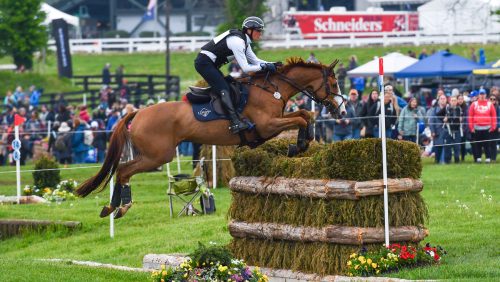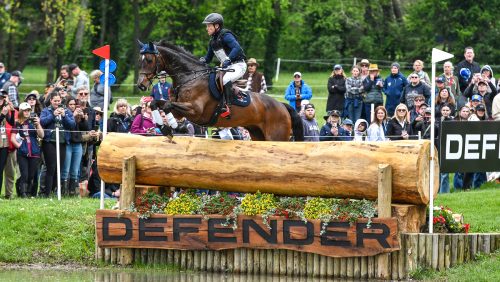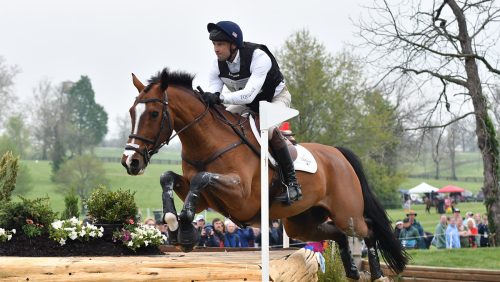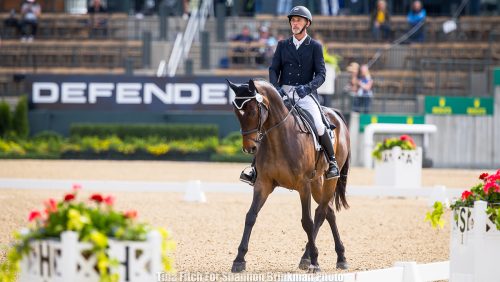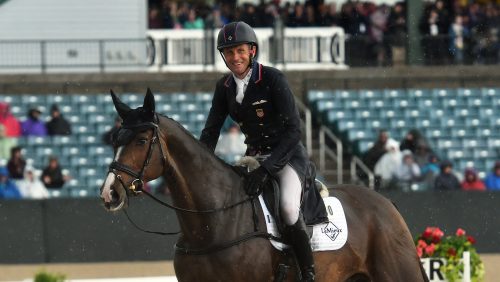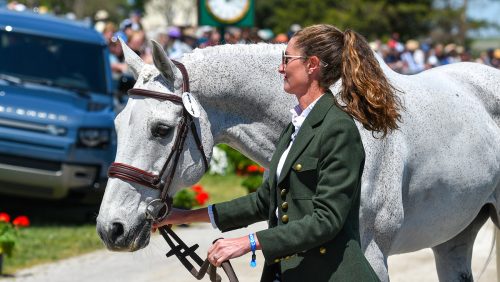Katherine Bell and Paige Juliette Garson said they didn’t have any trouble getting permission from their schools’ administrators to miss a week to compete at the American Eventing Championships.
And when they returned home from the Carolina Horse Park in Raeford, N.C., they had some great stories to tell as they finished first and second in the junior/young rider novice championship, separated only by the three-point margin of their dressage scores.
Even though they had to miss almost a week of school to compete on Wednesday, Thursday and Friday during the Sept. 14-18 event, 50 teenagers started the junior/young rider novice championship and another 32 horses started in the junior/young rider training championship. The open novice division had just three more starters, while 66 started the open training.
These four divisions were the biggest of the second annual U.S. Eventing Association-sponsored competition.
“They were pretty flexible,” said Garson, 12, a seventh-grader from Bangor, Maine, who rode her 14.1-hand pony Hillcrest’s McGyver to second place.
Bell, 15, a sophomore from Mobile, Ala., admitted, “At the event, it’s pretty hard to do schoolwork. So I try to use the ride home to do most of it.”
With a 14-hour drive facing her after collecting a pile of goodies for riding Snowy to the top, Bell was confident she could get her work done. Garson was a bit less sure, as she had only a two-hour plane ride to Boston and then a two-hour bus ride to Maine to do a week’s worth of lessons.
They probably had a harder time than usual concentrating on reading and writing since they were each enthralled with their gray mounts’ performances. Snowy and McGyver are the horses parents dream about for their children, but for different reasons.
Snowy, a Connemara-cross, stands 15.1 hands, and, as Katherine’s mother, Susan, said, “He’s got the sweetest eyes.” Katherine had never jumped a fence before she tried him at trainer Courtney Cooper’s barn near Unionville, Pa., two years ago. Katherine has spent the last two summers training with Cooper.
Katherine admitted she was anxious about John Williams’ demanding cross-country course, which included two water jumps and a three-element bank combination. “When I finished the cross-country, I was just so proud of him that he was so brave and did all that stuff for me,” she said.
After placing third in dressage, Snowy moved up to second with a faultless round, then ascended to the top spot when Bryttany Buenger and Uptown Girl, who’d earned a 27.0 in dressage, lowered three rails.
Garson and McGyver made a similar ascent, but from eighth place. Trainer Debbie Place made Garson wear a stopwatch at the AEC because the fiery McGyver, who has a stride that can cover horse distances easily and a jump to match, incurred speed faults at his last event.
“He loves to run and go fast on cross-country,” said Garson, who obviously likes the feeling. “You’re so low to the ground, it feels like you’re flying.”
Both Bell and Garson know it’s time to move on–each already has a successor horse–but they’ll miss these special first horses. Snowy was to return to Cooper’s to be sold; Garson’s younger sister Payton was to guide McGyver.
“I’ve been riding him since I was 9, and we’ve never had a refusal or a rail down, so I don’t want my little sister to take him over,” said Paige with a mischievous grin.
In Touch With E-Mail
Jessica Borchers had already missed her first month of school by the time she rode Windover to a clear show jumping round that kept them atop the junior/young rider championship at training level. Borchers, 16, spent the summer training with Karen and David O’Connor in The Plains, Va., but had to return to Ft. Collins, Colo., to get her junior year underway.
She’s kept up with her assignments and in touch with her teachers via e-mail. Borchers rides with a smooth, controlled style, and she clearly approaches her schoolwork with similar discipline. She wasn’t planning on frantically catching up while heading home to Colorado.
“I have horse time and school time. But cross-country is fun too,” she said simply.
Borchers had purchased Windover, an Oldenburg-Thoroughbred, from breeder Traci Newton in North Carolina just before heading to Virginia. They tied for second in dressage, then added no jumping or time penalties to stay 7 points ahead of Morgan Shank on Ryley, who moved up from 10th as the cross-country course took a toll. Some 21 of the 99 starters in the open training and junior training divisions were eliminated or retired, while 44 jumped clear.
“I thought we could be competitive,” said Borchers, who’s already made three preliminary starts with Windover. “I thought it was our best dressage test yet and that we were really becoming partners.”
Karen O’Connor confirmed that “they have a real chemistry together, and she’s a very, very focused girl, a very hard worker.”
Shank, 21, is in the middle of her own extended journey. She’s from Spokane, Wash., but after two years of college, she moved to Littlestown, Pa., to pursue her eventing fortunes. She lives there with trainer Cassie Frederick, because she rode with Frederick’s aunt Jean Golden in Washington. She’s not sure how long she’ll stay on the East Coast. “I’m going to have to find something to support my habit,” she said.
Although Shank and Ryley, a 13-year-old Thoroughbred she’s owned since he retired from racing at age 7, have made three preliminary starts, second place was truly an accomplishment. Ryley developed a bacterial infection in his hock two years ago, an infection from an unknown cause that was so serious veterinarians gave Shank only a 10 percent chance he could be a trail horse. And once he’d recovered, Shank fell off him while schooling a bank jump and injured her back, which prevented her from riding for several months.
Laughs And Gadgets
Nicole Kemerling, of Lewisville, N.C., had to overcome her own physical setback to nab the reserve title in the open training championship. On July 1, a young horse–not her mount Fiddlestix–threw Kemerling, 19, leaving her with a broken right shoulder and a severe concussion.
You might think that the horse she’d bring to the AEC would be a quiet, kind schoolmaster, but that’s not a description that fits Fiddlestix, a 6-year-old Hanoverian-Thoroughbred mare by Waldorf. “I pretty much got her for nothing because everybody thought she was insane and nobody wanted her,” said Kemerling. “I just laugh at her.”
ADVERTISEMENT
Kemerling and Fiddlestix, who placed fourth in open novice in 2004, added just .4 cross-country time faults to their third-placed dressage score of 33.9. That left her exactly .4 points behind the open training winner, Maria Brazil on Gadget des Brumes, with whom she’d been tied in dressage. Dressage leader Victoria Frey on Along About Daybreak faced mandatory retirement after falling at the first water jump, and second-placed Susan Reynolds on Dominic was eliminated for missing a fence.
Brazil, a 49-year-old anesthesiologist from St. Louis, Mo., is on a roll. She and “Gadget” were the low-scoring members of her team, called “the Bitch Pack” because all four are foxhunters, at The Chronicle of the Horse/ USEA Central Adult Team Challenge in Ken-tucky two weeks before the AEC.
“This is kind of a bigger deal–there’s a lot more prize money here,” said Brazil, who took home $2,000 for first place.
The money was why Kemerling decided to start in the open division instead of the junior/young rider division, which offered no cash. “I’m just a starving college student,” she said after collecting $1,000.
Brazil, who trains with Karen O’Connor, had also hoped to be in contention on Lottery Ticket in the open preliminary division. But he ran out at the first water jump (fence 4), a narrow “toothbrush” fence in the middle of the pond, and dropped her. After doing a swan dive into the drink, Brazil decided to retire.
“I’d had nightmares about falling off ‘Lotto’ and not being able to ride ‘Gadget,’ so I was weak-kneed at the start,” exclaimed Brazil, whose preliminary cross-country ride was at 9:09. Her training show jumping round was about three hours later, and she left the course to put on dry clothes and boots.
“Maria is a very, very serious amateur rider,” said O’Connor. “She went into that event really wanting to win it.”
Brazil bought Gadget, a Selle Francais gelding, sight unseen from horseman Julie Ulrich, who’s lived in France for more than a decade. Open novice winner Susan Moessner hadn’t seen her horse, Satin Dust, 6, before she arrived either. But that’s because she bred the Clydesdale-Thoroughbred mare–and the three generations before her.
Moessner, a trainer from Ann Arbor, Mich., started her breeding program with a half-Clydesdale mare she kept breeding to Thoroughbreds. Satin Dust is by the Thoroughbred Good And Dusty, and her dam is by the Thoroughbred Epic Win.
Moessner, 42, said she expected Satin Dust to be competitive in dressage, and the bay mare was that and more. She earned a 23, exactly 1 point better than runner-up Confabulate and Andria Allen. Both horses finished on those exceptional scores, 6 points ahead of the rest of the field.
The Carolina Horse Park cross-country course, which winds in and out of the pine woods, did concern Moessner. But it wasn’t the jumps. “She got attacked by coyotes two years ago–she and other horses had bite marks on them–and she hasn’t liked going into the woods ever since then. So it took her four or five fences to relax and get in gear,” said Moessner.
The trip from Michigan took Moessner 14 hours, about a third as much time as it took Allen to drive from Longmont, Colo. Allen and fellow novice competitor Cynthia Hunter spent three days driving 1,800 miles, but since Hunter works as a photographer for Featherlite trailers, the company sponsored their excursion.
Allen, 46, has been a real estate agent for the last two years, since just before she bought Confabulate, 5, an Oldenburg. Before that, Allen was a communications officer in the U.S. Air Force and then was vice president of customer operations for Level 3 Communications.
If The Saddle Fits. . .
Moessner’s favorite prize was the Amerigo saddle the winners each got. She needed it because a student had torn the flap off her saddle when a horse rubbed it against the wall while on the crossties.
Open preliminary winner Doug Payne, of Califon, N.J., wasn’t too excited to get a new jumping saddle at first, since he’d just bought one. But he cheered up when runner- up Nate Chambers, the 2004 open preliminary winner, told him the Amerigo representative would get him a dressage saddle instead.
Payne, 23, and Chambers, 18, came from behind to grab the top spots. Payne and Corner-house rode to a tie for third place in dressage, 1.5 points off the pace, while Chambers and Rolling Stone II rode to seventh.
“It was a bit disappointing for me, because I really wanted to win again,” said Chambers, of Vienna, Va. “It wasn’t an awful test, but it wasn’t up to his usual standard. But I have to admit I was a bit nervous going into it.”
Chambers and Rolling Stone were faultless on cross-country, while Payne incurred 1.2 cross-country time penalties because Cornerhouse was too excited to go in the starting box. Their clear show jumping rounds heaped the pressure on Alison Kelly-Coates, who lowered one rail on Irish Cavalier to drop to third.
Payne and Chambers have each developed their horses themselves. Payne found Cornerhouse, barely broken at age 5, in a field in Ireland in 2002 and placed 10th at the Morven Park CCI* (Va.) in 2004. He’s now aiming for the Radnor Hunt CCI** (Pa.) on Oct. 6-9.
“I’m certainly very happy–and it’s very rewarding to have won this–but it’s not the end. There are a lot bigger things, and I’m certainly not going to just sit on this,” said Payne.
One of the bigger things he’s doing is starting a career as a forensic engineer–someone who reconstructs car accidents and other mishaps–for the New Jersey State Police. He’s in the midst of the force’s enrollment examinations. “If I get in, it’s basically like going to boot camp for a few months. That will kill my spring season, but after that the schedule is flexible,” said Payne.
Chambers bought Rolling Stone to be a dressage horse, then switched to eventing and taught him to jump under the tutelage of trainer Paul Ebersole. Chambers and Rolling Stone won the CCI* at the North American Young Riders Championships in July.
Diana Brown finished ninth in those championships on One 2 One, an 11-year-old Thoroughbred, but faultless jumping, on top of her third-placed dressage score, moved her to the lead in the AEC’s junior/young rider preliminary championship.
Brown, 18, grew up in Dallas, but she’s just moved to Columbia, S.C., to start college at the University of South Carolina. And she’s just started training with advanced rider Tiffani Loudon-Meetze.
“I didn’t know quite what to expect since this was the first event I’d done since young riders,” said Brown. “And this is the first time I’ve ever done an event without my mom being here.”
Her mother, Susan Brown, decided to stay in Dallas, but she and Diana talked on the phone several times a day. “She’ll call and say, ‘It’s been 10 minutes since you rode, and you haven’t called,’ ” said Diana.
ADVERTISEMENT
AEC Tidbits
Karen O’Connor accepted the training horse championship on Mandiba, a 6-year-old Irish-bred. She bought him from William Micklem, from whom she and husband David O’Connor also purchased Custom Made, Giltedge, Biko and Joker’s Wild. “Life’s very easy for him now, but when he won at the Kentucky Classic [two weeks earlier], I rode him by the Head of the Lake and said, ‘Take a good look at this because you’ll be back here someday,’ ” said Karen.
Allison Springer started Pharaoh’s Tale, winner of the novice horse championship, when she worked for the O’Connors a few years ago. Now she’s riding him again for owner Lulu Davis of Louisville, Ky. Springer, 30, also rode Folk Lore to fourth in the novice horse division. Pharaoh’s Tale is by Phar Dante, sire of A Phar Cry, Karen O’Connor’s mount in the intermediate championship. Pharaoh’s Tale is out of Winter’s Tale, who competed at advanced with Michael Godfrey.
Bobby Stevenson, of Southern Pines, N.C., split Springer’s two horses, taking second and third in the novice horse division, on Happy and Icewine. By the Southern Pines-based stallion Not Surprised, Icewine is out of the same mare, Lynjetter, as Just Lyndi, winner of the open intermediate division at the Southern Pines Horse Trials in March.
Mark Weissbecker, also from Southern Pines, rode Top Gallant to the tricolor, and the U.S. Eventing Association’s DeBroke Trophy, in the preliminary horse championship. Top Gallant, a 10-year-old Thoroughbred who raced until he was 8, won the Virginia CCI* and the Southern Pines Horse Trials in March.
Courses With The Right “Flavor”
John Williams designed the course for all five levels of this year’s American Eventing Championships, and he said that he made the most changes to the advanced and intermediate courses, previously designed by Capt. Mark Phillips.
“I tried to keep the best of what Mark left behind and change the rest to more my flavor,” said Williams, who lives in Southern Pines, N.C.
But he did make one big change to the novice and training level courses. “We went overboard in measuring the distances very snugly last year,” he said, recalling the legions of riders galloping wildly to finish under the optimum time.
“So we adjusted the track this time and took the time out of the equation, a bit too much for my liking. It proved too easy to make for championship-level horses,” he said.
Novice horses routinely finished 30 seconds fast, while training horses were finishing 10 to 15 seconds fast.
But the first several fences on all five courses–which follow largely the same track around the Carolina Horse Park–required riders and their horses to be focused right from the start. The first novice horse on course stopped at fence 1, and many stopped or ran past the table at fence 3. Fence 3 on the preliminary course, a water trough underneath a tobacco shed, ended many dreams too.
Most of the riders appreciated that the cross-country courses had a major impact on the competition’s outcome, that it wasn’t just a dressage show. “These were championship courses,” said open training winner Maria Brazil, who also rode in the open preliminary championship.
“I’d like to see more novice courses like this,” said Susan Moessner, the open novice winner.
“Being a national championship, I would feel that each horse at each level should be ready to go on the next level, and certainly a lot of the winners already had,” said Williams.
He was most proud of his advanced course, where only two horses finished with jumping faults, while one was eliminated for a fall and two retired on course. But only winner Will Faudree completed the course within the optimum time.
“We don’t have to keep making the courses harder and harder to get some kind of statistical result. The horses and riders who are most efficient across the ground are going to get to the top. If I can find a subtle way to add that element back in for novice and training, I will,” he promised.
Faudree and Kiener Star In AEC’s Top Levels
Although he won a team gold medal at the 2003 Pan American Championships, Will Faudree’s Antigua has often played second fiddle at major competitions. In 2000 he was an alternate for the Australian Olympic team in Sydney, and in 2004 he and Faudree were alternates at Athens.
So when Antigua, a 16-year-old, Australian-bred Thoroughbred gelding, won the advanced title at the American Eventing Championships, Faudree felt that “Brad” was finally getting the limelight that he deserves.
Based in nearby Southern Pines, N.C., Faudree, 24, supports himself by riding and training full time, so the victory contributes not only to his list of achievements, but also to his livelihood. And the $4,000 prize money he took home will pay for a few entry fees this fall.
Faudree took second in dressage (26.3) among the 26-horse field, behind Corinne Ashton on Dobbin (24.8). But he moved to the top when Ashton had a run-out on cross-country. Antigua was the only horse to complete cross-country in the time allowed, giving him a lead of more than two rails.
But Faudree said that he “didn’t even look at the scoreboard to see if I had rail [in hand]. I was just paying attention to what I had to do.”
Antigua lowered one rail as Faudree bravely rode all the direct lines and took inside turns to avoid time faults.
Nathalie Bouckaert Pollard and West Farthing, the advanced AEC winners in 2004, also lowered one rail as they climbed from seventh in dressage to second place, adding 2.0 cross-country time penalties.
Faudree also placed fifth in the advanced championship on Nanki Doubleday’s Wild Frontier, a horse he hadn’t competed since the Jersey Fresh CCI*** (N.J.) in May.
“Brad’s a special horse, and I have nothing to prove on him,” said Faudree. “It’s a privilege and an honor to get on him–most people never have that, and I’m exceptionally lucky to have him in my life. He has really outlined the way I look at horses, my job and riding. It would be an honor to take him to the World Equestrian Games next year.”
Jessica Kiener, riding My Boy Bobby, also kept her cool in the intermediate championship and held on to her 5.8-point overnight lead, despite one rail down in the show jumping. Kiener, 31, started out in second place after dressage (32.5), but she moved up when Carol Kozlowski, who’d scored 32.3 on Nordic Sparrow Hawk, succumbed to mononucleosis and headed home to rest.
My Boy Bobby, a 9-year-old Irish Sport Horse gelding, belongs to Carl and Cassie Segal, at whose farm Kiener works in Pottersville, N.J. She also trains with Buck Davidson. My Boy Bobby and Kiener completed their first advanced horse trial together at Millbrook (N.Y.) in August. She plans to run at the Virginia CCI** in November, then move up to advanced again next year.






